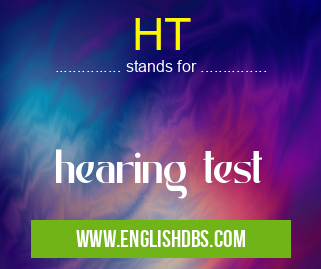What does HT mean in BRITISH MEDICINE
HT stands for Hearing Test. Hearing tests are used to evaluate a person’s ability to hear and understand sound. They can detect a range of problems, such as age-related hearing loss, hearing loss caused by exposure to loud noise, or issues related to the anatomy of the ear. Hearing tests can be performed in a doctor’s office or audiologist's clinic and are usually painless and relatively quick procedures.

HT meaning in British Medicine in Medical
HT mostly used in an acronym British Medicine in Category Medical that means hearing test
Shorthand: HT,
Full Form: hearing test
For more information of "hearing test", see the section below.
Common Types of HT Tests
Pure-tone audiometry is one of the most common types of hearing test used by doctors and audiologists for evaluating a person's ability to detect different tones at various levels of intensity (loudness). Other types of hearing tests include tympanometry which measures pressure changes within the eardrum, acoustic reflex testing which measures muscle reflexes in response to sound waves, and otoacoustic emissions testing which measures small movements in the inner ear hair cells when stimulated with sound waves. A comprehensive hearing test may include some combination all these techniques in order to accurately identify any underlying problems with an individual's ability to hear or interpret sound.
Essential Questions and Answers on hearing test in "MEDICAL»BRITMEDICAL"
What is a hearing test?
A hearing test is an assessment that measures a person's ability to hear. It helps to diagnose and monitor any potential hearing loss or changes in hearing over time. With today’s technology, it is easy and painless to determine someone’s hearing health.
Who should get a hearing test?
Generally, anyone who may experience challenges with their hearing should get a hearing test. This includes people of all ages from newborn babies to seniors, who might be more at risk for age-related hearing loss. Additionally, those exposed to loud noise environments such as construction workers should consider having routine tests.
Will I need special equipment?
No. For most tests, you won't need any special equipment other than the device that your doctor uses for testing. This usually consists of headphones or earbuds connected to an audiologist machine, and is designed specifically for testing your hearing levels accurately.
How long does a typical hearing test take?
The amount of time needed for a complete auditory assessment will vary depending on the type of test being conducted and the individual being tested; however, typically they last between 10-30 minutes. During this time audiologists will evaluate different aspects of your auditory system including frequency range and acoustic reflexes.
What can I expect during my appointment?
During your appointment you can expect to answer questions about your medical history as well as lifestyle habits such as job environment and recreational activities like hunting or playing music instruments. Your audiologist will then conduct different tests while measuring how loud you can hear different sounds at various frequencies.
Is there any preparation required before my appointment?
Not typically; however it is good practice to avoid caffeine before your appointment as it can make it more difficult to focus in the listening booth environment used for testing. Some people may choose to bring along a friend or family member for moral support if they feel comfortable doing so.
Is there any discomfort associated with taking the test?
Generally speaking no; simply put on the headphones provided by your audiologist and follow their instructions throughout the various tasks presented during the assessment period. In rare cases earbuds that enter more deeply into the ear canal may cause some mild discomfort but generally this subsides after just a few minutes.
How accurate are audiometric tests?
Audiometric tests are highly accurate when conducted properly by experienced professionals using up-to-date equipment within specified environmental conditions (i.e., absence of background noise). These results are then interpreted based on an individual's responses in order to provide meaningful results.
Final Words:
In summary, HT stands for Hearing Test - an assessment designed to detect irregularities in a person's ability to hear or process sound correctly. While there are many different types of hearing test available depending on what information needs to be gathered from the patient, they all involve measuring both physical parameters associated with healthy function as well as behavioural responses related to interpreting sound stimuli. All together this information helps doctors or audiologists identify any potential issues so that they can provide timely interventions before further damage is done.
HT also stands for: |
|
| All stands for HT |
